Windows 11 Causes TPM Shortages, Scalping: Here's Where to Buy
Thanks, Microsoft
Windows 11 is Microsoft's first operating system to require a TPM, or Trusted Platform Module, sending frantic would-be upgraders to online retailers in search of hardware modules. Demand has exploded overnight as users try to nab a TPM as quickly as possible to ensure their PC is compatible with the new operating system, but the market is rough. In some cases, TPMs that sold for $15 are now as high as $100 through eBay.
As you can see in the charts below, we took a deep look at the TPM market to see how prices and availability have been impacted in the immediate aftermath of the Windows 11 announcement. We also have a guide to which modules are available for your motherboard.
The TPM market has largely imploded overnight, with nearly all modules being completely out of stock. Some TPMs are still available, but they're only available at significantly higher pricing. Scalping is already taking hold, just like we currently see in many other areas of the PC market. Whip in the ongoing chip shortages that could make timely restocks more of a dream than a reality, and we could see a prolonged period of TPM shortages set in.
The good news is that the physical module will be optional on most systems, thanks to all modern Intel and AMD CPUs featuring a firmware-based TPM that operates inside the chips' trusted execution environment. If you have a motherboard that supports CPU-based TPM, you can turn it on via the UEFI/BIOS.
Each motherboard marker typically sells a specific TPM that will work with most, or all, of its motherboards. If you're on the hunt for a physical TPM to get Windows 11 support, here's what the market looks like.
Gigabyte TPM Modules
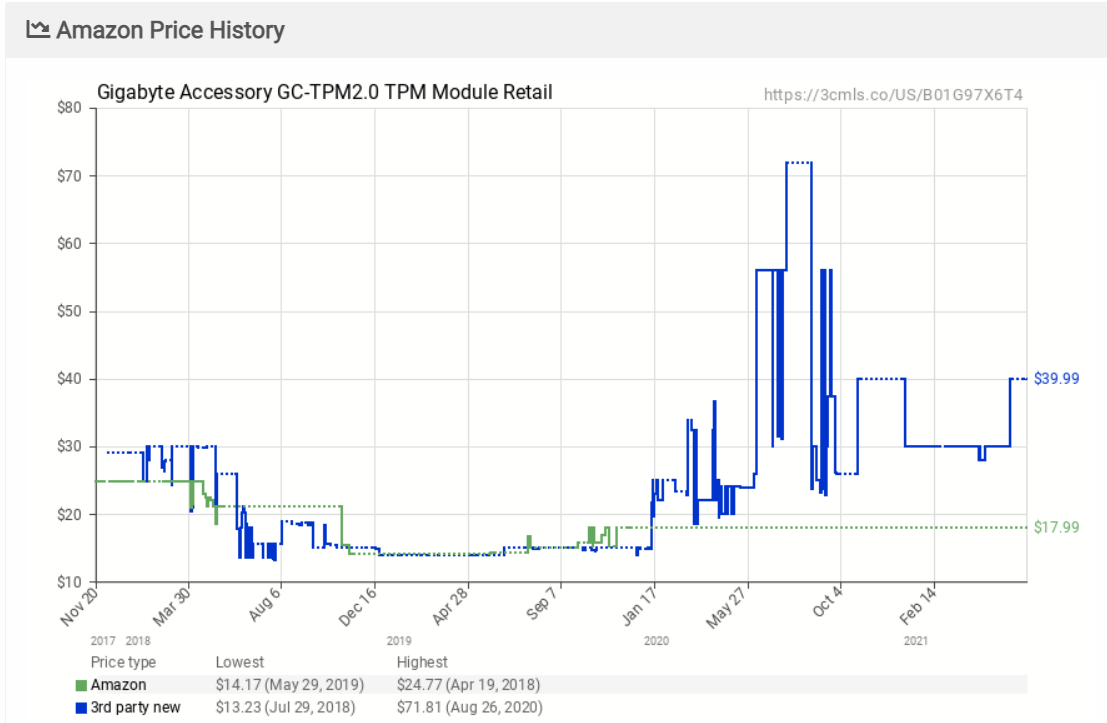
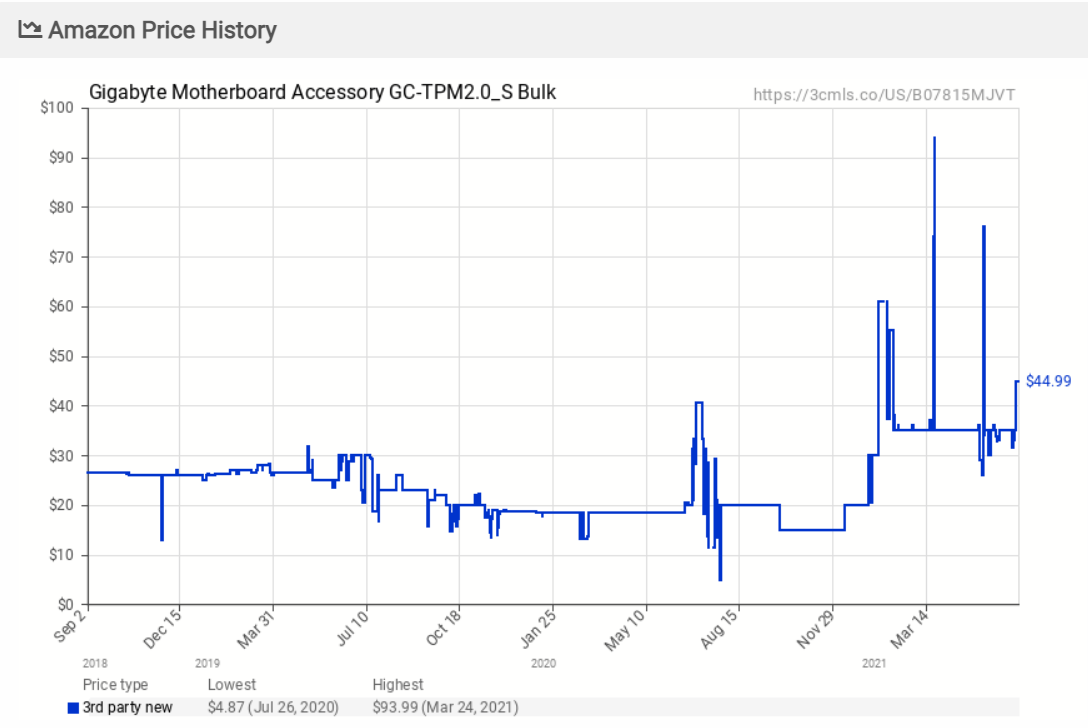
All of Gigabyte's TPM modules are currently out of stock from popular retailers like Newegg and Amazon, and there's no indication when they'll be restocked.
Gigabyte has two TPM modules available for its motherboards, which we'll detail below. The quick take is that pricing has exploded on eBay: The GC-TPM2.0 module is available for a whopping $89.99, which an absurd price for a simple TPM that retailed for $15. Not to mention the GC-TPM2.0_S, which was priced even higher on eBay at $100 before it went out of stock. That device usually retails for $20.
Gigabyte has two modules available in the U.S. The GC-TPM2.0 supports Intel 200-series boards all the way down to 9-series (Z97 & X99, for example) as well as AM4 and FM2 boards (we assume it supports all AM4 and FM2 boards as Gigabyte doesn't specify chipset models).
Get Tom's Hardware's best news and in-depth reviews, straight to your inbox.
The GC-TPM2.0_S is a newer module designed to support the much more recent Intel 300-series chipset boards and X299 for HEDT platforms. For AMD, this TPM module supports all 500, 400, and 300 series boards and TRX40 for Threadripper. This chip doesn't support FM2 motherboards, unlike the other Gigabyte module.
According to retail price histories, the GC-TPM2.0 has had a wide range of prices over the past two years. Pre-2020 saw prices as low as $15, but that increased to a whopping $70 at its peak in mid-2020. As for 2021, pricing was last seen at around $35.
Fortunately, GC-TPM2.0_S appears to have a more steady price over the past few years. Throughout late 2019 and all of 2020, we see pricing as low as $20 and remain relatively consistent there. However, as 2021 rolled in, prices doubled to roughly $50 on average, with peaks of $80 and $90. The most recent price is $44.99.
Asus TPM Module
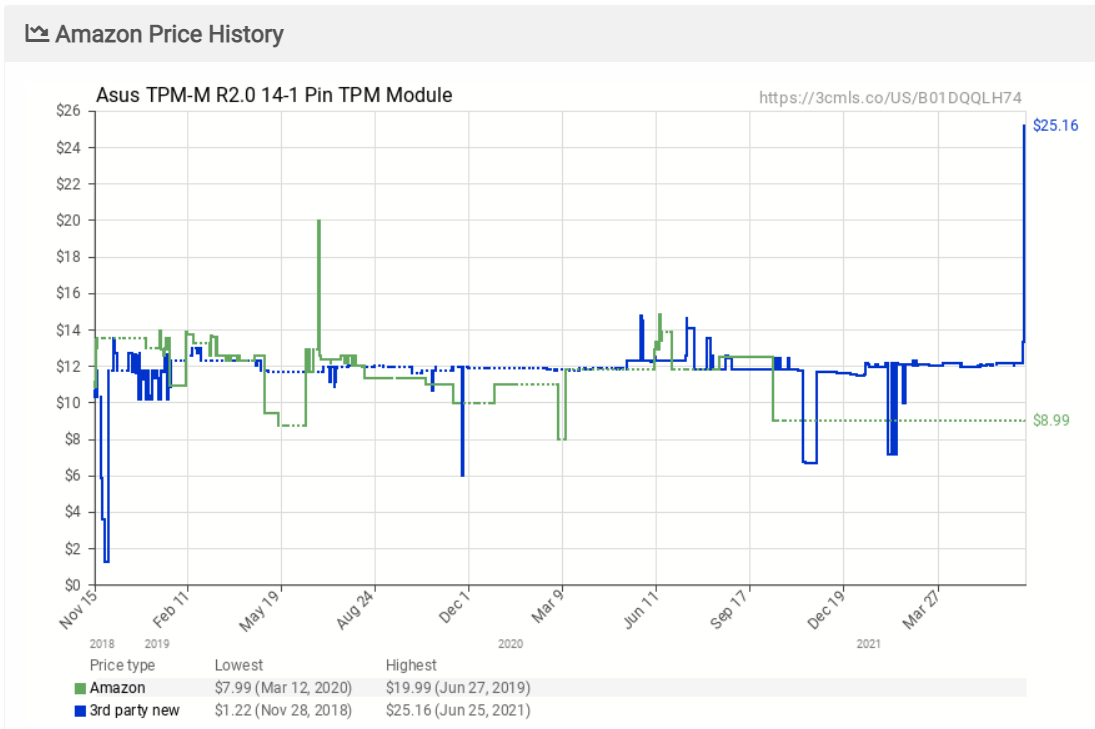
For Asus users, the choice of buying a TPM is very simple: The TPM-M R2.0 is the lone product. Asus doesn't provide details as to specific motherboard support, so we believe this module is designed to work on all Asus boards that support physical TPMs.
Pricing for the TPM-M R2.0 is significantly better than Gigabyte's offerings by a fair margin. Pricing skyrocketed to $25.16 just before it went out of stock on June 27th. This model is also sold out on eBay.
MSI TPM Module
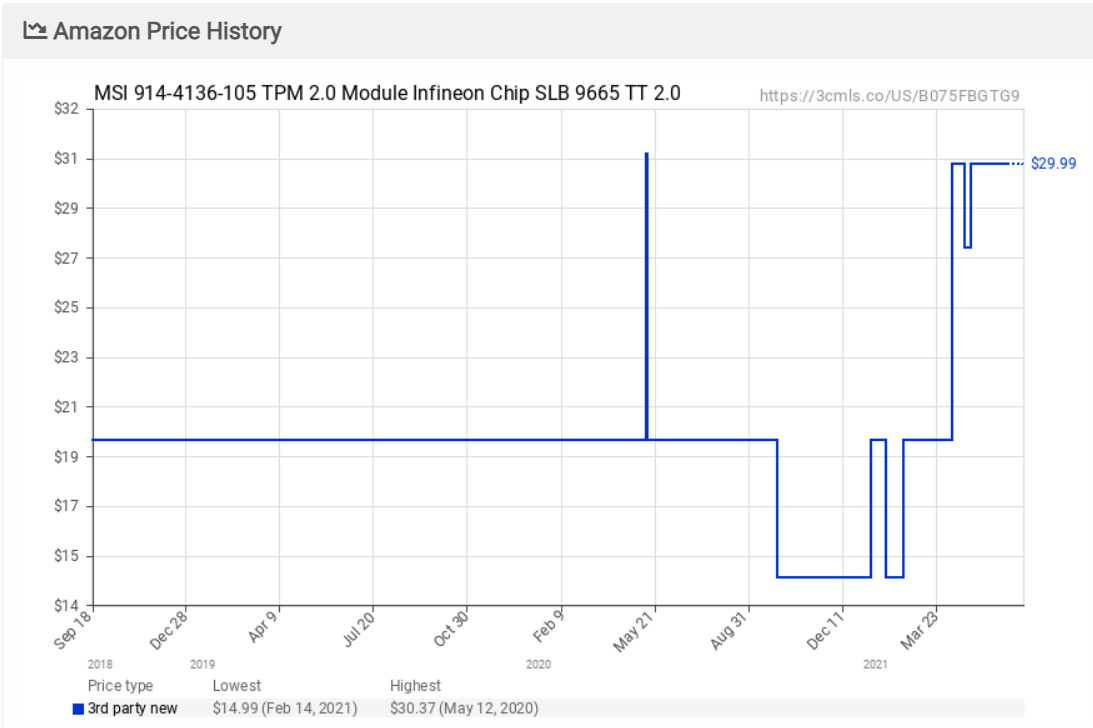
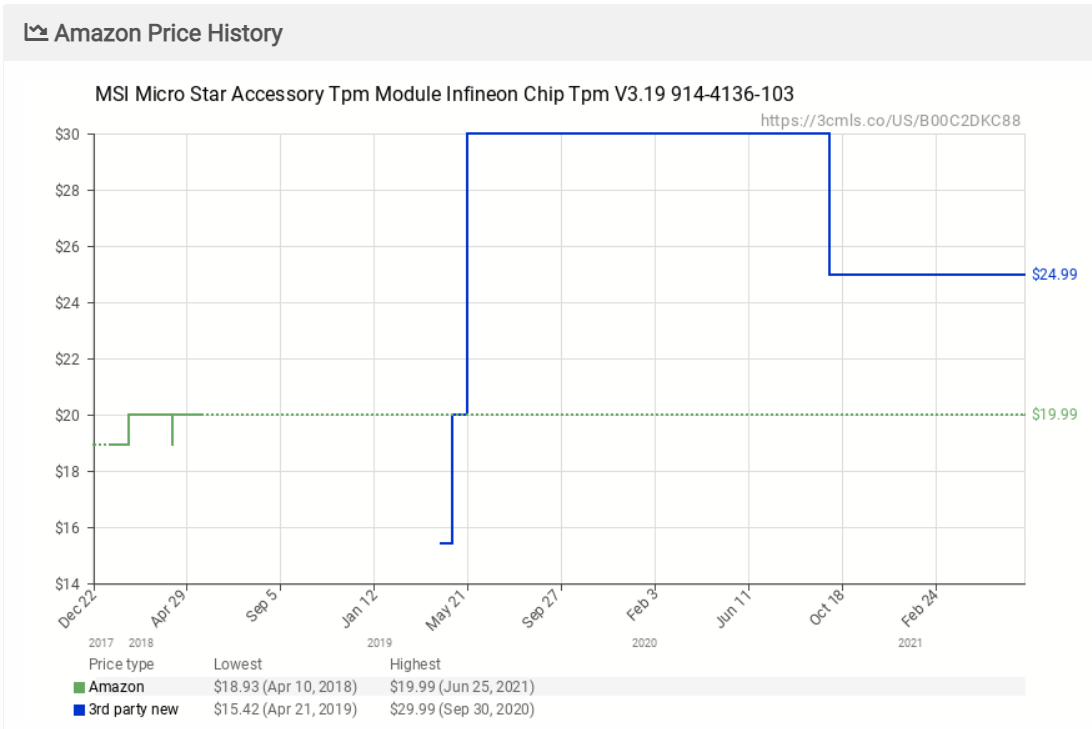
MSI has two TPM modules, with one actually available to buy today from Amazon via a third-party seller.
We have no specifications at all for the TPM V3.19 (B00C2DKC88) — neither MSI's website nor Amazon provide compatibility information. According to customer reviews, it does work with modern Intel boards spanning from H77 to B450.
The MSI MS-4136 is another option. This TPM is designed to fit onto Intel 300-series and AMD 400-series boards.
MSI does have a newer TPM module, the MS-4462, that supports AMD 500-series and Intel-400 series motherboards, but is only available at MemoryExpress. At least the price is respectable at $19.99
The TPM V3.19 module is available for $24.99, but the MS-4136 is currently out of stock.
Supermicro TPM Module
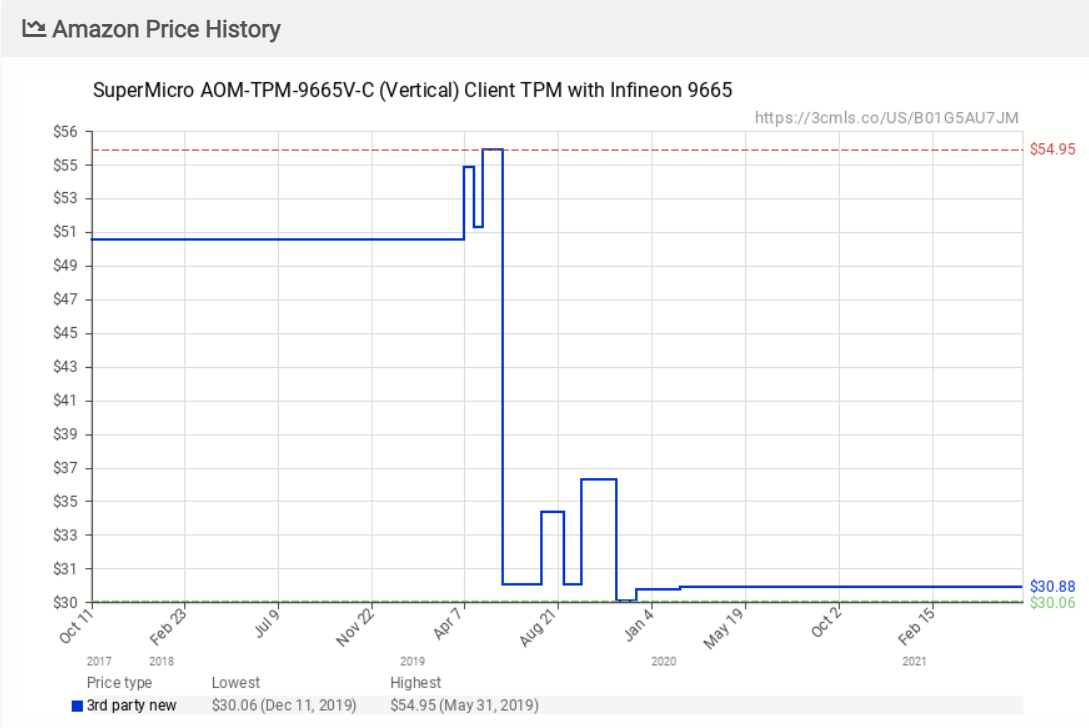
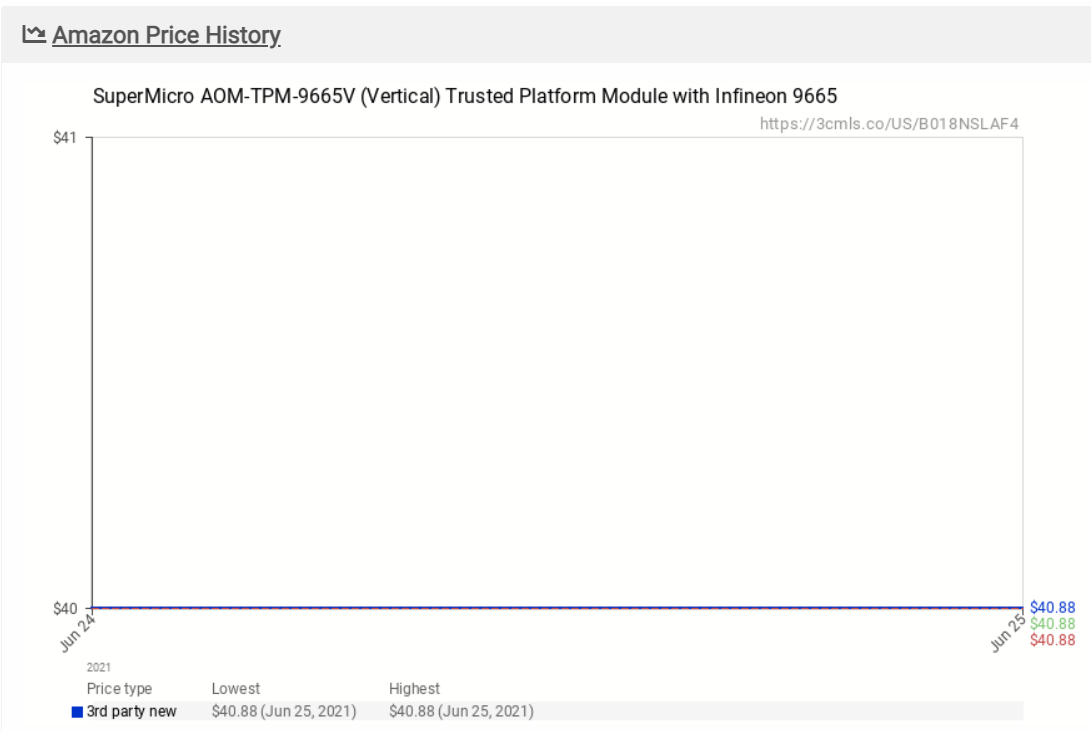
Supermicro has two TPM modules: The AOM-TPM-9665V-C and the AOM-TPM-9665V. The 9665V-C is designed to support Intel Core i5/i7 chips and Xeon E3 CPUs. The 9665V model is designed to support any Supermicro board with a TPM header.
You can pick up the AOM-TPM-9665V-C chip right now for $34.85 on Amazon. As for the AOM-TPM-9665V, pricing is rock solid steady at $40.88 as it's only been on sale (from Amazon) since yesterday.
Getting a TPM module for your motherboard is definitely going to be a difficult task, as these devices are either out of stock or incredibly expensive. Generally, anything above $20-25 for a simple TPM is too expensive, but thanks to Windows 11 requirements, expect the situation to get worse before it gets better.

Aaron Klotz is a contributing writer for Tom’s Hardware, covering news related to computer hardware such as CPUs, and graphics cards.
-
Colif Next week: MS removes need for TPM, scalpers left with 1000s of TPM they can't sell now.Reply -
Entropy&Insanity ReplyColif said:Next week: MS removes need for TPM, scalpers left with 1000s of TPM they can't sell now.
Exactly. Microsoft isn't THAT stupid (this is arguable I know), they will change anything that isn't to much work to maximize their client base. If something lowers that, they fix it. Even though existing Windows 10 users can upgrade for free, a hell of a lot of people will buy the retail version. That's a good chunk of Windows sales. If a large enough client base can't install it, sales will not only suffer, but word will spread from the experienced users down to the people who don't know from friends, work colleagues. etc... -
saudor Reply
Getting my popcorn ready! I hope they get screwed over so badly.Colif said:Next week: MS removes need for TPM, scalpers left with 1000s of TPM they can't sell now. -
hotaru.hino They were kind of hard to find anyway. Or at least they were in limited quantities when I bothered looking around for them over the years.Reply -
spongiemaster MS is a bunch of amateurs. If they want to create a real shortage and drive up prices, they need develop a cryptocurrency that can mine with TPM modules.Reply -
Colif Reply
i want one that uses floppy drives, create demand for an extinct technologyspongiemaster said:MS is a bunch of amateurs. If they want to create a real shortage and drive up prices, they need develop a cryptocurrency that can mine with TPM modules. -
ThatMouse Just think of how many 1000's of hours wasted people trying to get TPM working, possibly bricking their machine. What a waste of time and resources.Reply -
Giroro There is literally no reason to buy a TPM right now.Reply
Even if you are in the very small category of people who doesn't have one, and actually needs any of the "none" new functionality enhancements offered by Microsoft's newest, slower, bulkier, buggier, data-stealingest, less-customizable reskin of vista.
The dumb thing doesn't even have a release date, but its like 6 months away.
Odds are, some opportunistic sociopath decided to spend $1Million buying out every chip they could find, hoping to corner a market which didn't even exist.
If missing a chip means Microsoft reaches the end of intrusively forcing non-optional probably-broken "upgrades" onto your system, then that's probably a good thing.
When was the last time Microsoft added anything to Windows that you actually found useful, or at a minimum could uninstall? I think for me it was the Snip tool, which they are removing for the objectively worse "snip and sketch".
Before that, the improvements were just a laundry list of making the worst parts of windows 8 have a bit more of the functionality of Windows 7; like ditching the unusable "start screen".
So maybe I'm just biased, but so far Windows 11 looks the operating system equivalent of a Samsung Galaxy S21. -
TerryLaze Reply
MS isn't a mom and pop store, they have clients that are huge and buy millions of copies at once.Entropy&Insanity said:Exactly. Microsoft isn't THAT stupid (this is arguable I know), they will change anything that isn't to much work to maximize their client base. If something lowers that, they fix it. Even though existing Windows 10 users can upgrade for free, a hell of a lot of people will buy the retail version. That's a good chunk of Windows sales. If a large enough client base can't install it, sales will not only suffer, but word will spread from the experienced users down to the people who don't know from friends, work colleagues. etc...
Selling security to those clients is much more important then selling a couple of copies more to retail.
Windows 10 will be supported for another 4 years at least so nobody should be in a hurry, until you have to update chances are you will have upgraded to something that will meet all requirements anyway. -
Joseph_138 $100? I've seen them up to $200 now.Reply
Oh, and there are actually 3 Asus TPM modules
https://www.asus.com/product-compare?ProductID=10766,10023,10022&LevelId=Motherboards-Components-Motherboards
Two of them are 14-1 pin, but the blank is in a different location on each of them, so that's how you know which one to buy. The third one is 20-1 pin, which also makes it obvious which one you need to use.